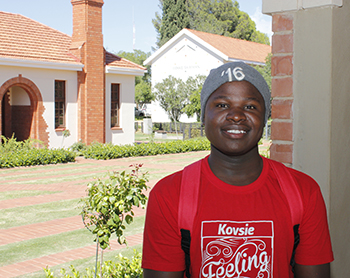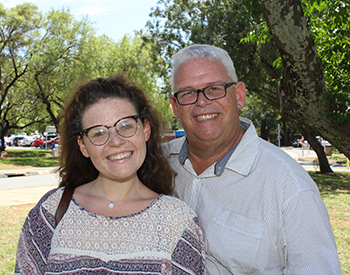
Tshepo Thajane, winner of the Kovsies
Star of Stars competition.
Photo: Eugene Seegers
Although first-year registration officially started on 23 January 2017 at the University of the Free State (UFS), the Marketing department invited some of the top-achieving matrics in the country to an event on Friday 20 January to assist them with early registration. These high-flying pupils have AP scores of 40 and above, and worked hard to get to where they are today, with driving ambition for their future.
The #StarOfStars
Tshepo ”Doctor” Thajane is the winner of the newly-established Kovsies Star of Stars competition, and as such received a full bursary from the UFS, among other sponsorships. He has enrolled in Actuarial Sciences and will be housed at the Karee residence. When asked what drew him to our university, he responds: “I just loved the university before I entered it, and I chose the UFS because of the respect I was shown.”
Friendly reception
Lendl Ontong will be pursuing his LLB in the Faculty of Law, and has obtained a place in the brotherhood of the Karee residence. The Ontong family hails from Worcester in the Western Cape. Lendl’s father, Mr Lionel Ontong, had this to say of his experience: “The staff at the UFS, especially at the admissions office, is the friendliest group of people I’ve ever come across, and helpful as well. My wife was sceptical when I told her about the friendly treatment I experienced when I phoned the university, but when she witnessed it today, she could see it first-hand. The friendliness is contagious, and even though I’m tired after the long journey, their attitude has rubbed off on me. And my wife now has the assurance that her child is going to be happy here. The atmosphere is one of homeliness. It’s fantastic! Even the netball coach introduced herself to my son and invited him to pop in for a cup of tea, and she won’t even be involved with his university journey. It meant a lot to us as parents.”

Jani Gerber and her dad Jaco Gerber.
Photo: Eugene Seegers
Runs in the family
Jani Gerber is a second-generation Kovsie who hails from Port Elizabeth. She won the cultural division in the Matriculant of the Year competition in 2016 and was invited to join the UFS. According to her, she “didn’t even consider another university”.
Her dad, Mr Jaco Gerber, says: “The whole process of application and registration was very efficient and professional. Jani’s older sister, Anri, completed her MBChB at UFS last year and is currently working at the Pelonomi Regional Hospital. Jani has already been adopted by new friends in her residence. She says, “Some charming students welcomed us at the residence, and even helped out when we were unpacking.” Jani has aspirations to sing in the annual Stagedoor and Serenade Singoff competitions.
We welcome all our first-years and look forward to supporting them throughout their university journey!